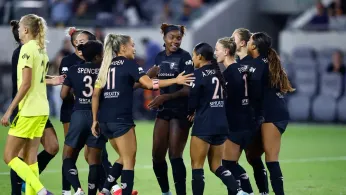
Nov 11
Angel City FC Teammates Condemn Op-Ed Calling for Gender Eligibility Rules
READ TIME: 2 MIN.
Angel City FC has become the center of a heated debate in women’s soccer after defender Elizabeth Eddy published an opinion piece in the New York Post calling for the National Women’s Soccer League to adopt strict gender eligibility rules. The article, which suggested that all players must be born with ovaries or undergo genetic testing, has been widely condemned by teammates, the club, and the league’s players’ union for its transphobic and racist undertones .
Angel City captain Sarah Gorden and vice captain Angelina Anderson issued a joint statement rejecting the article’s language and its implications. “That article does not speak for this team,” Gorden said, emphasizing that many teammates felt hurt, harmed, and disgusted by the piece. She described the undertones as transphobic and racist, particularly because the article featured a photo of Orlando Pride player Barbra Banda, an African woman, and referenced gender eligibility controversies that have disproportionately affected African athletes in women’s sports .
Angel City FC released an official statement affirming its commitment to equity, inclusion, and belonging. The club emphasized that while individuals have the right to express their opinions, the article does not reflect the organization’s values or the views of the team. “Since our founding, Angel City has remained committed to equity, inclusion, and belonging. These principles will always guide how we show up for our team, fans, and community,” the club stated .
The NWSL Players Association also issued a statement condemning attacks on players and expressing solidarity with African women who have been targeted by divisive rhetoric. “We stand firmly with all our members—including, and especially, the African women who have been targeted by divisive and demeaning rhetoric,” the union said. The NWSLPA clarified that every NWSL player was assigned female at birth, including Banda, and reiterated its commitment to protecting the rights and dignity of all players .
Eddy’s article argued that the NWSL needs clear standards to protect women’s sports and competitive fairness, citing examples from swimming and track and field. She proposed policies such as requiring all players to be born with ovaries or to undergo an SRY gene test, referencing standards used by other sports organizations. However, critics have pointed out that such policies are widely considered discriminatory and have been opposed by experts, including the researcher who discovered the SRY gene .
The controversy has highlighted the ongoing challenges faced by transgender and intersex athletes in sports, as well as the broader issues of racism and exclusion in women’s soccer. The NWSL currently has no transgender players, and its previous policy allowed transgender women with testosterone levels within typical limits for women athletes to participate. However, the league has not implemented any new eligibility rules since Jessica Berman became commissioner in 2022 .
As the debate continues, Angel City FC and its players have reaffirmed their commitment to creating a safe and inclusive environment for all. The club’s public stance and the strong response from its captains have been seen as a powerful statement in support of LGBTQ+ and African players, and a reminder of the importance of solidarity in the face of discrimination .






